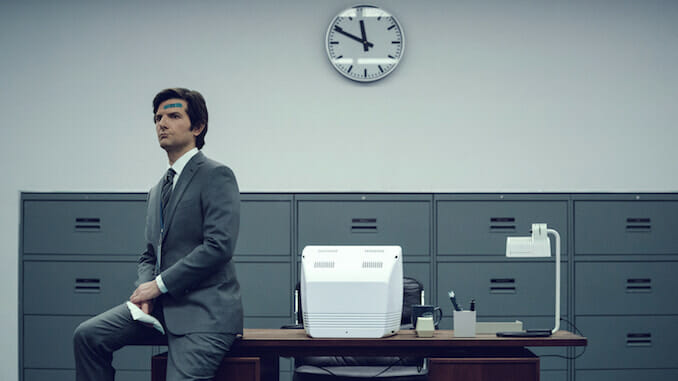Apple TV+’s Severance Is Strange, Frustrating, Very Good, and Then Frustrating Again
Photo Courtesy of Apple TV+
Of the million ways that Severance, the new Apple TV+ drama directed by Ben Stiller and Aoife McCardle, could have failed, the first and most obvious is its setting in a claustrophobic office space. It hammers on a theme that lost much of its resonance sometime over the last decade, around the same time that the dominant motif of middle-class American life transitioned from boring to “comedically terrifying.” It’s hard to give much artistic credit to depictions of soul-killing ennui when the clowns of the apocalypse are dancing outside your window; being consigned to a lifetime of office drudgery now feels like a quaint concern. So on first viewing, as I watched the main character Mark (played by Adam Scott) march through a series of blindingly white corridors, a picture of monotony inhabiting an environment that is both sterile and creepy, I thought, “man, this is going to suck.” But I also thought, “even if it didn’t suck, who can tolerate this anymore?”
Three days later, I finished the Season 1 binge and I can report that Severance does not suck, though it takes about an episode and change to eventually transcend what had seemed like hard limits on viewer engagement. Part of the solution lies in the solid, vaguely sci-fi premise: A group of people working for an evil company (Lumon Industries) have opted to go through the title procedure, severance, in order to mentally separate their work selves from their “real” selves. This involves needles going into brains, and the net effect is that it creates worker drones who literally only have the barest consciousness while at work. The minute they step out of the elevator to go home, they snap back to the real world, with everything that happened in the past nine hours totally forgotten.
If you don’t think about it for more than two minutes, this might seem like an attractive idea. You—the “you” who lives outside work—get to just cut out the entire shitty workday, along with whatever stress and disappointment comes from it, and your entire life is now just the good parts. When you think about it for that third minute, though, the full horror dawns: You also create a secondary “you” living in a godforsaken work zoo, never sleeping, never going outside, literally living an entire life of stepping on and off elevators and sitting at a desk, ad nauseam, until the day your “outie” self (that’s what they call it in the show, “outie” and “innie,” please do not yell at me for I did not make this up) decides to retire, at which point you just die.
In our world, you’d like to think that the obvious psychological torture would preclude any of this from ever happening, even if it were technologically possible, but let’s not get too hung up on the realism here. The important thing is that the artificial separation works as both a plot device and a metaphor. The metaphor, as I understood it, relates to how those of us in jobs where we must sacrifice some (or all) of our values compartmentalize it and try not to let it affect how we perceive ourselves as citizens/parents/friends/spouses. Or, forget jobs, you can go broader and compare it to life under capitalism, and how much—and in which spaces—we can participate without feeling complicit in horrific effects we never see. We all have a bit of severance, and etc. etc. etc., and what this show does exceedingly well is show how our compartmentalizations simply do not work; our selves bleed into each other, slowly and inevitably, and there is no escaping even the misery and consequences we don’t see.
But as is the case with art, the metaphor is not as important as the damn story, and as a narrative engine, the concept of severance is a mover. Mark is joined in his office by Irving (the always excellent John Turturro) and Dylan (Zach Cherry), but the real force behind the story comes from Helly (Brit Lower), a new employee with a mysterious background, and Petey (Yul Vazquez), Mark’s former co-worker who is attempting to bridge the divide between the innies and outies and uncover just what the hell Lumon Industries is up to. On the corporate side of things, they’re controlled and opposed at every moment by two of the more insidious, unsettling characters I’ve ever had the (dis?)pleasure of watching in Patricia Arquett’s Peggy and Tramell Tillman’s Milchick. Both actors embody the eerie, almost robotic ethos of the sinister corporation almost too fully, to the point that you’ll get the bad kind of shivers.
-

-

-

-

-

-

-

-

-

-

-

-

-

-

-

-

-

-

-

-

-

-

-

-

-

-

-

-

-

-

-

-

-

-

-

-

-

-

-

-








































